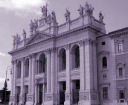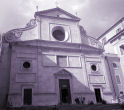Making the Stations of the Cross in Lent - there seem to be different views on Simon of Cyrene helping Jesus. Among the mystics: Luisa Piccarreta, "Simon unwilling and grumbling, not by love but by force", Maria Valtorta, "the man from Cyrene, strong man, about forty standing near donkey and his sons sons... the man from Cyrene feels such pity, as he sees that Mary cannot embrace Her Son..."
Prayer and meditation of the Twenty Hours of Jesus Passion, 5 PM to 4 PM.
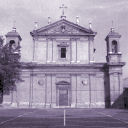
At Rome, the Station is in the church of St. Anastasia, where, formerly, the Mass of the Aurora on Christmas Day was celebrated. The first church was built in the late 3rd or early 4th century, and was one of the first parish churches of ancient Rome. It was given by a woman called Anastasia and called titulus Anastasiae after her. Later, it was dedicated to a martyr of the same name.
Catholic Culture: Stational Church Rome
| Stations of the Cross from the Maronite Archbishop of Syria | ||
| Posted: Monday, February 23, 2015 6:02 pm | ||
| ||
|
Simon of Cyrene https://lordofsick.wordpress.com/2014/11/05/fifth-station-simon-cyrene-helps-jesus-carry-the-cross/
Fifth Station: Simon of Cyrene helps Jesus to carry the cross
1

Station V Simon of Cyrene helps Jesus carry the cross
PRAYER
Leader: We adore you, O Christ, and we praise you.
All: Because by your holy cross You have redeemed the world.
All: Because by your holy cross You have redeemed the world.
Jesus, the soldiers are becoming impatient. This is taking longer than they wanted it to. They are afraid you won’t make it to the hill where you will be crucified. As you grow weaker, they grab a man out of the crowd and make him help carry your cross. He was just watching what was happening, but all of a sudden he is helping you carry your cross.
As a child, sometimes I see people who need my help. Sometimes I pretend not to hear when my parents call me. I disappear when I know others could use my help.
As an adult, sometimes I try to do as little as I can and still get by. Others might need my help, but I ignore their needs. Even when I’m asked to help, I sometimes claim to be too busy.
My Jesus, blest, thrice blest was he who aided Thee to bear the cross. Blest too shall I be if I aid Thee to bear the cross, by patiently bowing my neck to the crosses Thou shalt send me during life. My Jesus, give me grace to do so.
Our Father…. Hail Mary…. Glory be to the Father….
Leader: Jesus Christ Crucified.
All: Have mercy on Us.
Leader: May the souls of the faithful departed, through the mercy of God, Rest in peace.
All: Amen.
All: Have mercy on Us.
Leader: May the souls of the faithful departed, through the mercy of God, Rest in peace.
All: Amen.
Heart touching devotional song narrating about the station in this video is written by Fr. Abel C.M.I. in Malayalam Language of Kerala State, India. All viewers may not understand the meaning of the lyrics, but the music will surely touch your heart. This video also contain short narration and images of some of the places like, Gethsemane, Golgotha, Jerusalem, Tomb of Jesus etc. These informations and images are collected from Internet. I am not sure about the correctness of the same. Aim of the video is to make the people to think about the burdens and sorrows Jesus took for us.
If possible, it is good to pray and meditate Way of the Cross daily which will give peace and happiness in mind and also protect from Satan and Sin.
May the crucified Jesus Bless you and your family.

.jpg)




.jpg)

.jpg)

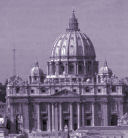




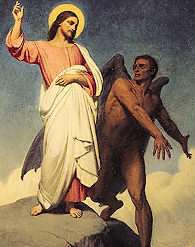
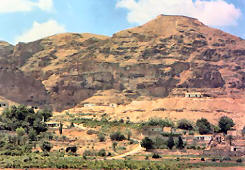 The sincere Christian will find a hundred such ways in which to thank and honor Christ during this holy season of Lent. We can all keep the last verse of today's reading before our minds with great profit. "Repent and believe in the gospel." This is the essence, the marrow, of Christ's teaching. Turn away from sin and come back to God. Anyone who believes in the gospel, who believes that there is an everlasting life after death prepared by God for all those who do his will while on earth, should not find it hard to give up offending that loving God who thinks so much of him. This life is only a passing shadow, every step we take, every breath we breathe is bringing us nearer to our earthly end and to the grave. But the believing Christian knows the grave is not the end. Rather, is it the beginning of the true life—provided we use this passing shadow, these few years, properly.
The sincere Christian will find a hundred such ways in which to thank and honor Christ during this holy season of Lent. We can all keep the last verse of today's reading before our minds with great profit. "Repent and believe in the gospel." This is the essence, the marrow, of Christ's teaching. Turn away from sin and come back to God. Anyone who believes in the gospel, who believes that there is an everlasting life after death prepared by God for all those who do his will while on earth, should not find it hard to give up offending that loving God who thinks so much of him. This life is only a passing shadow, every step we take, every breath we breathe is bringing us nearer to our earthly end and to the grave. But the believing Christian knows the grave is not the end. Rather, is it the beginning of the true life—provided we use this passing shadow, these few years, properly.